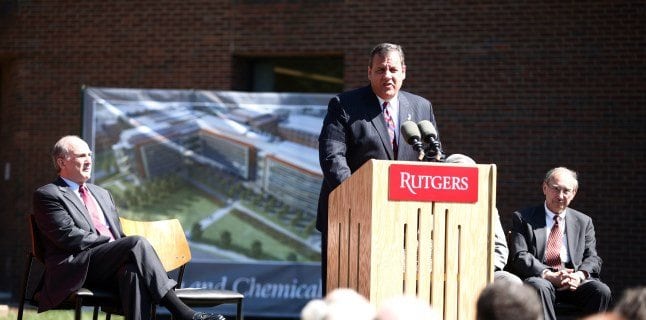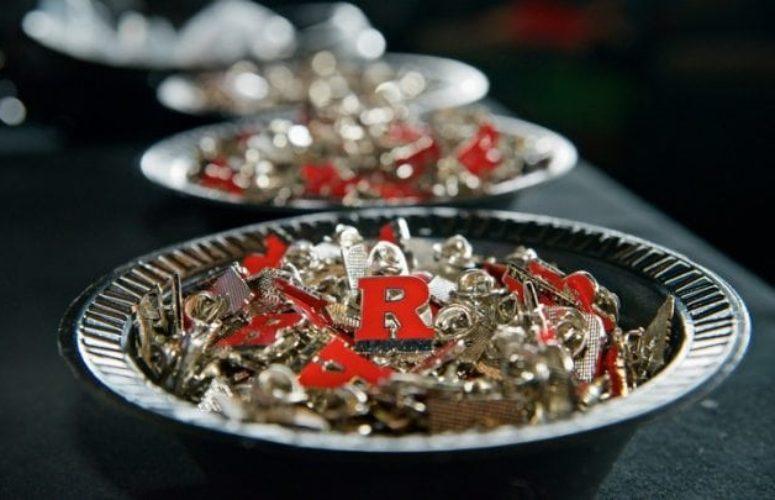
Rutgers Breaks Ground for State-of-the-art Chemistry and Chemical Biology Building
On Jun 16, 2014New Jersey Gov. Chris Christie and Rutgers University President Robert Barchi marked the start of a new era of science instruction and research today as they joined with state officials and members of the university community to break ground for the new home of the Department of Chemistry and Chemical Biology (CCB).
The four-story, 145,000 square-foot facility will provide critically needed teaching, laboratory and support space that will enable Rutgers to expand and accelerate its innovative research in drug design, alternative energy, biomaterials and nanotechnology.The $115 million project is funded largely by the 2012 Building Our Future Bond Act.
“With these extraordinary new facilities, Rutgers University is poised to be a national leader in terms of scientific instruction, research and federal research funding,” said Gov. Christie. “Rutgers will be positioned to compete with and even surpass its peer institutions, making it an even greater magnet for top students from New Jersey and, indeed, from around the world. The 2012 Building Our Future Bond Act was the first major capital funding for higher education in New Jersey in decades, and I am proud of my administration’s role in developing it in a bipartisan approach with the Legislature and the wide public support it ultimately received.”
The new classrooms and labs are key to enhancing the high quality science education at Rutgers. More than 5,000 Rutgers students take chemistry courses each semester. In addition, the CCB building will allow the university to build upon its tradition of collaborative research with leading academic labs, federal entities and private industry in New Jersey and around the world.
“This remarkable new building befits a premier research institution,” said President Barchi. “Rutgers ranks first among U.S. universities in federal funding for chemical research. Our chemistry and chemical biology faculty are world leaders in discovery and innovation, and our students go on to successful and distinguished careers in the pharmaceutical, chemical and health care industries in New Jersey and beyond. The chemistry and chemical biology building demonstrates our commitment to continued excellence in science education and research.”
Core facilities in the CCB building will include a microscopy suite, a class 100 chemistry clean room as well as optical spectroscopy, nuclear magnetic resonance spectroscopy and X-ray crystallography laboratories. Classrooms will provide the latest technology to support teaching and learning. The facility’s modular design and versatile infrastructure will allow reconfiguration of labs and classrooms to respond as technology evolves and the needs of students and faculty change. Common areas are designed to promote collaborations.
The new building will be located adjacent to the Wright-Rieman Chemistry Complex on the Busch Campus. The first building in the complex was opened in the late 1940s and additional facilities were built in the 1960s and 1970s. Despite some improvements over the years, the complex cannot accommodate the demands of contemporary science teaching and collaborative, multidisciplinary research.
In the last decade, 75 percent of Rutgers’ peer institutions have invested in new chemistry facilities. The CCB building will enable Rutgers to better compete for top-notch faculty and the best and brightest students.
The innovative research occurring inside the new CCB building will be matched by the cutting-edge sustainability features of the building itself. Besides conforming to state of New Jersey energy mandates and guidelines, Rutgers seeks to achieve a Leadership in Energy and Environmental Design (LEED) Gold certification for the building by reducing its energy usage. Numerous green features are designed into the project, including windows that maximize natural light and manage heat gain, advanced air handling and exhaust systems, construction materials made with a significant percentage of recycled content, and native vegetation to encourage biodiversity and reduce the need for irrigation.
The chemistry and chemical biology building is slated for completion in fall 2016, the year Rutgers will celebrate its 250th anniversary.
Related Articles:





